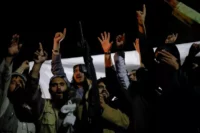Charles III saw climate change coming. Can he still speak out?
There’s a line from Shakespeare for any situation. “Uneasy lies the head that wears a crown” from his “Henry IV, Part II” is appropriate for King Charles III, as he takes up his long-awaited crown, and in exchange sets down his lifelong passions and causes. There’s a real pathos to that transition, especially on subjects such as climate change and the environment, where Charles has been not merely correct but a generation ahead of the curve.
Sign up for a weekly roundup of thought-provoking ideas and debates
Long derided by critics as “the meddling prince” for his outspoken advocacy on matters of government policy, Charles now occupies a position in which — under the terms of Britain’s unwritten constitution — he is expected to express no opinions at all.… Seguir leyendo »





